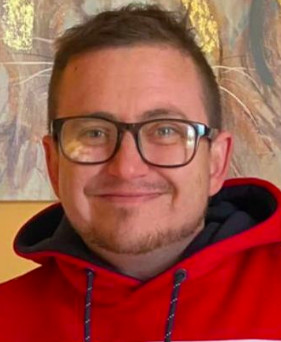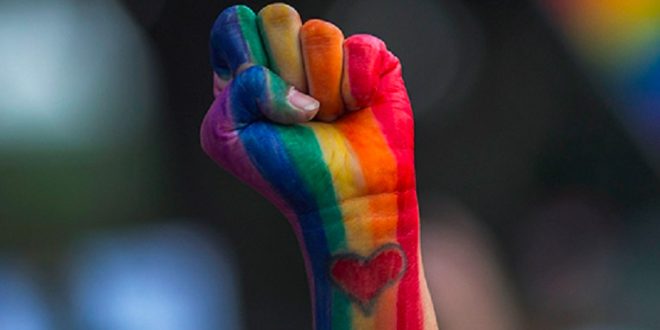
Codey Parsons, Player Protection Analysts at LiveScore Group, share his deeply personal journey from a youth marked by confusion and struggle to the realization and acceptance of his transgender identity.
This poignant and empowering journey illustrates the trials, complexities and triumphs of transitioning, underlining the importance of acceptance, understanding, and the need for a supportive workplace in a world that can often misunderstand what it means to be transgender.
When I was younger, I always knew I was different. I didn’t fit in well and I went through life trying to fit in, being ‘part of the crowd’ but struggled throughout school. Most days I’d tell my mum I wasn’t well to try and stay home as I feared another day of not coping. After a long, difficult few years, I tried to just fit in with society and conforming to its “norms”.
I was severely bullied for having a port wine Birthmark on my hand, so with this and the fact that I didn’t know who I was, life was hard… I mean being a kid is hard in itself.
At this point, I was really struggling with my sexuality, thinking I was gay to try and fit in, but knowing every day that this wasn’t me.
At the age of 22, I realised this was not me and asked my mum to talk. I will never forget the moment when I told my mum I was Transgender. Her words were “Ahh that’s amazing I already knew. We are here 100% and will back you no matter what happens in life”.
From that moment I had so much relief it was like I could finally start being me.
I went to my doctor who congratulated me for being so brave for speaking out and for being my true self, and who then referred me for hormone injections.
In the following weeks, I changed my name by Deed Poll and started changing my documents over to my new name. I was so shocked by how well companies changed everything so quickly and were non-judgmental towards me, but I was still nervous as back in 2010 it was not like today.
I told my work, who at that point never had anyone who had transitioned despite employing over 2500 staff. I worked with them to announce this to the business and received praise for coming out by most people, apart from the odd person who asked what toilets I would be using.
Due to hormones, they didn’t want me to take on too much work. I was due to start in a new role and they said, “We feel it’s best for you to stay where you were”. I never understood this as I felt fine, I was happy, but I felt some management just didn’t understand, and as they didn’t have enough knowledge of this, they didn’t embrace change nor did they know what to do.
I therefore decided to look for a company that was very involved with LGBTQIA+ and this lead me to start up a group called Face Value for 16-25-year-old people. I helped them talk and supported them with housing jobs applications and interviews, and created a safe friendship zone where people could come and be themselves.
I also joined the board for the hate crime committee for Sussex police, where I could help with change. We looked at ways to help support the community more, and reduce crime against these individuals.
Transitioning is not as straightforward as you may think. You don’t wake up a man straight away. You go through years of testosterone injections, which you then take for the rest of your life. There are also surgery complications, and so much more you learn that not everyone will understand. You will lose people on the way, but you value the ones who stand tall with you even more.
Over the next few years, I had my first surgery, which was a Double Mastectomy (where they remove your breasts).
Then I chose to go through radial forearm surgery. There are several different surgery’s you can choose now, but I picked this one as this is exactly what a natal man has if they were in a car accident, for example, and lost all or part of their penis.
This surgery is completed over 3 stages – one to create the penis, one to remove all your internal female parts, and one to hook up your penis to your urethra so you can pee standing up.
The first surgery is 10 hours, the second 6 hours, and the third surgery around four hours.
After my second stage of surgery, I went home and was not feeling well. I could not move to get up and I noticed my speech started going. After trying to explain the surgery to NHS 111, which was impossible back then, my mum gave up and called my local GP out who said I was fine and just needed to rest.
I recall sitting there with multiple tubes and three drains in me thinking that I wasn’t going to make it through the night, and after taking lots of medication to try and lower the pain, I fell asleep.
When I woke up, I could not speak or move at all. My dad got me in his cab and drove me 3 hours to London even though I had no appointment. He wasn’t taking ‘no’ for an answer as he knew I was flagging to a point he had never seen before.
I sat in the waiting room in a private hospital and my dad told them we were not leaving until I had been looked at.
It took three doctors to pick me up and carry me in their hands to a bed. They could see that I was deteriorating in front of their eyes. My surgeon came in and removed my bandages and puss flew two feet in the air – the next minute I was rushed into surgery.
Ten hours later I woke up with drains, tubes, and breathing aids. I had been put on multiple injections and tablets to fight the infection and stayed in the hospital for 16 days.
This was by far the scariest point of my life, and all I could think about was my family. I turned this into a positive experience by posting my day-to-day updates online to show how when things go wrong, if you are positive, you can get through it – and became a positive influencer in the Transworld around this surgery.
When I got home it took me 6 months to be able to walk properly, and slowly over time my speech and ability to walk improved. It never fully returned. I am forever grateful to my family for all their support. They have not just supported me; they have given me that drive to believe anything is possible and held me tight the whole way through.
In 2018 I went to my Christmas party and started speaking to my now-life partner. We clicked and got on so well; when I told her I was transgender she didn’t care and looked at me for me. We talked for hours I just had so much respect for her.
No matter what anyone said, she always has my back and has always been the friend I wanted to have, and is now my soul mate.
A year ago, I was finally able to change my birth certificate to Male, which is only possible legally once you have lived in the acquired gender for at least 2 years, and you have to do this via a Gender recognition panel. At the time, the cost to change this was £140, but this has now been changed to £5.
During my transition my mental health went downhill to the point where I tried to commit suicide and woke up 3 days later in the hospital as I was just not coping with how people around me reacted to my transition.
13 years ago, it was so hard for me, and now I know 13 years on how hard it is for those transitioning and for their families. I know how important it is to support people more than ever, as we are all humans no matter our gender. To be able to be yourself and live your life to the full is all I want to do and if I can help others even if it’s one person that means the world.
I made positive steps to help others by becoming a mental health first aider so I can offer that non-judgmental support to others now, what will be the positive steps you will make?
How life started to change in a positive way.
I finally decided to have a fresh start in Stoke and joined LiveScore. From the first day, I remember how kind people were, and I will never forget a conversation with an employee – she didn’t bat an eyelid. It was like I could finally be myself. The staff were so kind and really embraced my knowledge of the community.
I built up amazing work relationships with individuals who believed in me – you all know who you are – and I cannot thank you enough as you have helped changed my life. I will always be forever grateful.
Over the course of a year, I started helping more around equality, diversity, and inclusion in the business with comms and information that I have learned over time, and created a Transgender policy that went live in June 2023.
Having a very positive reflective nature, I love to share my positivity in life with others and I make sure when I am working, I always spread happiness and joy as they say a smile is free in life.
Recently we set up the Iridian Group – an LGBTQIA+ and Allies group to help support staff and educate staff in the business. This helps everyone know it’s okay to have a bad day as there is always support, and if it is not you, but someone close to you, we can also support you with this.
The group is there to drive change to help educate LiveScore staff, and to make our mark within the company.
I’m so grateful to LiveScore as I have finally found a place in my life where I can not only be me but can help the company grow.
I wanted to share my story as some days are bad, but hold on and reach out to those around you.
At LiveScore we have support available for everyone and are making the company not just great – we are going to make our mark and drive equality, diversity, and inclusion to the next level!
Here is some further reading for those who are interested in some educational information and facts on this subject.
- Interesting Facts
Did you know that Transgender people can legally change their Birth certificate? They do this by getting a Gender recognition certificate through the Gender recognition panel.
Once the application is granted, they are considered in law to be of their acquired gender.
- you must be at least 18 years of age.
- you must have a diagnosis of gender dysphoria or equivalent.
- you must have lived in your new gender for at least two years.
- you must intend to live in your new gender for the rest of your life.
- What is Gender Dysphoria:
Gender Dysphoria is a term used to describe a sense of unease that a person may have because of a mismatch between their biological sex and their gender identity. Treatment for Gender Dysphoria aims to help people live the way they want to, in their preferred gender identity or as non-binary.
Gender Dysphoria or gender identity services are specialized services that are directly commissioned by NHS England. There are three components of the Gender Dysphoria pathway, each of which works to a separate service specification:
- a therapeutic service for children and young people up to 18 years of age, and their families; including a linked paediatric endocrinology service for hormonetherapy.;
- Gender Dysphoria Clinics from 17 years of age, offering assessment, diagnosis, overall care coordination, hormone treatments, voice and communication therapies and talking therapies.
- Surgical interventions of the chest and genitals for adults.
____________
Codey Parsons, Player Protection Analysts @ LiveScore Group










